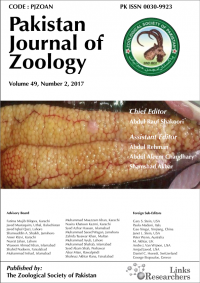Effect of Different Salinity Level on Breeding, Fertilization, Hatching and Survival of Nile Tilapia, Oreochromis niloticus (Linnaeus, 1758) in Captivity
Effect of Different Salinity Level on Breeding, Fertilization, Hatching and Survival of Nile Tilapia, Oreochromis niloticus (Linnaeus, 1758) in Captivity
Abdul Malik1,2, Ghulam Abbas1,*, Abdul Ghaffar3, Sara Ferrando4, Lorenzo Gallus4 and Syed Sajjad A. Shah2,3
ABSTRACT
To share on other social networks, click on any share button. What are these?









